Kerosene or Propane Portable Heater
If you spend a lot of time outdoors or working in your garage or workshop, you know sometimes the temperatures can be unfavorable. This is where propane and kerosene heaters from Mi-T-M come in handy to keep you warm all year round. With dozens of portable heaters to choose from, it may be hard to decide which is right for you. This article will help you understand the difference of kerosene vs propane heaters.
As you begin shopping, here are 4 questions you should ask yourself before making a purchase:
- Firstly, you need to decide where and when will you use the heater. We recommend different models for different uses. In a ventilated garage or on a worksite where you would need a propane heater indoors, you might prefer a kerosene forced air model. For dinner parties on the deck, try our outdoor patio heater.
- Secondly, do you prefer a kerosene or propane model? Kerosene is combustible, burns strongly and offers a strong amount of heat. By contrast, propane burns cleaner and tanks can easily be found at most gas stations and grocery stores.
- How long will you need to run the heater? A propane model running off a 20-pound propane cylinder set at low will last for up to 72 hours and set at high will last for 24 hours, depending on the model. However, if you just need some warmth while you’re in your garage, you might prefer a kerosene forced air heater.
- Will you need to carry the heater long distances? If so, you will need to consider the weight and wheel kit of each model. Many units already feature wheel kits for portability, so make sure to consider how far you will need to transport your heater to and from jobsites and work areas.
Portable Kerosene Heaters
The heat from our models of kerosene heaters—measured in British thermal units (BTU’s)—range from 75,000 up to 600,000 BTU’s per gallon. Mi-T-M’s kerosene air heaters provide dependable heat for large ventilated areas up to 15,000 square feet. They feature built-in temperature control and sure start ignition.
Portable Propane Heaters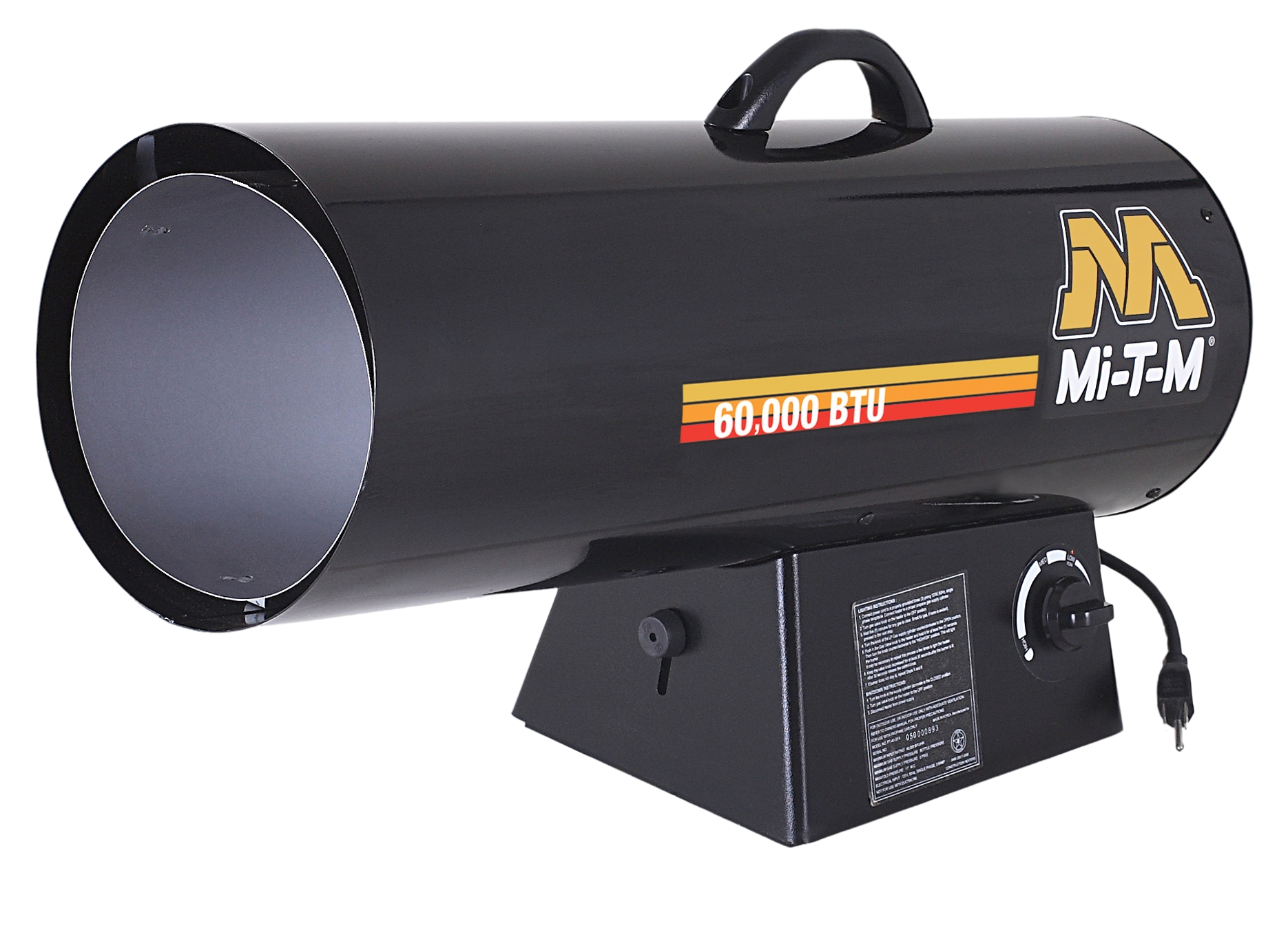
Mi-T-M propane heaters offer 40,000 up to 375,000 BTU’s per gallon. Mi-T-M’s propane heaters are lightweight, portable and ideal for drying and heating well ventilated workspaces. Mi-T-M offers several options of propane heaters, including forced air propane heaters that are perfect for jobsites, propane tank-top radiant with variable heat controls, propane radiant outdoor patio heater and our propane cabinet utility heater. Just add a propane cylinder, plug in your heater and stay comfortable in cold temperatures.
Portable heaters can be used in a variety of situations and locations – for emergency power outages, to heat outdoor events, in ventilated garages and work areas, on construction sites and much more. Wherever and whenever you need warmth, a portable heater is the perfect solution.
For more information on Mi-T-M heaters, frequently asked questions, videos and more, visit our heaters page.
For questions and to purchase a Mi-T-M heater, call or visit your local Mi-T-M dealer.




 Latest Equipment
Latest Equipment
 Accessories
Accessories
 Pressure Washers
Pressure Washers
 Air Compressors
Air Compressors
 Generators
Generators
 Air Compressor Generators
Air Compressor Generators
 Air Compressor / Generator / Welders
Air Compressor / Generator / Welders
 Portable Heaters
Portable Heaters
 Water Treatment Systems
Water Treatment Systems
 Trailers
Trailers
 Water Pumps
Water Pumps
 Wet / Dry Vacuums
Wet / Dry Vacuums
 All Residential Products
All Residential Products
 All Commercial Products
All Commercial Products
 Pressure Washers
Pressure Washers
 Generators
Generators
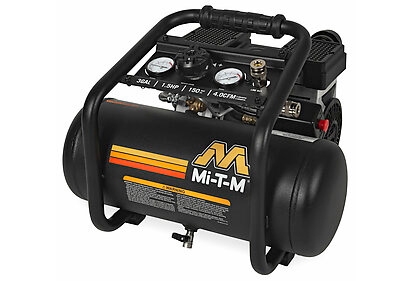 Air Compressors
Air Compressors
 Custom Fire Pits
Custom Fire Pits
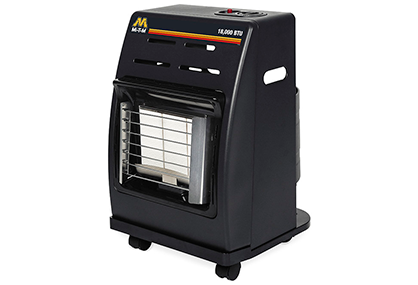 Portable Heaters
Portable Heaters
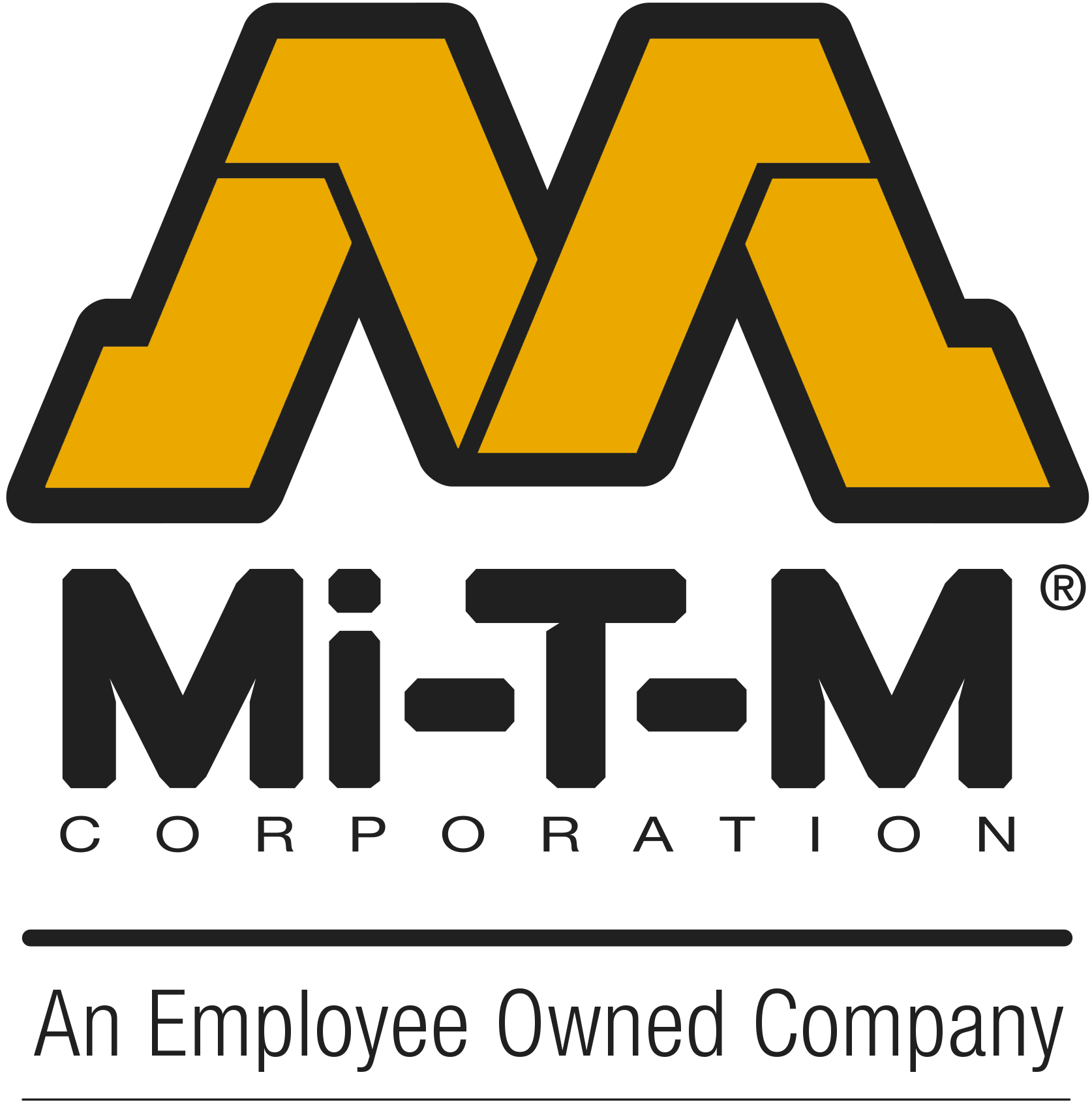




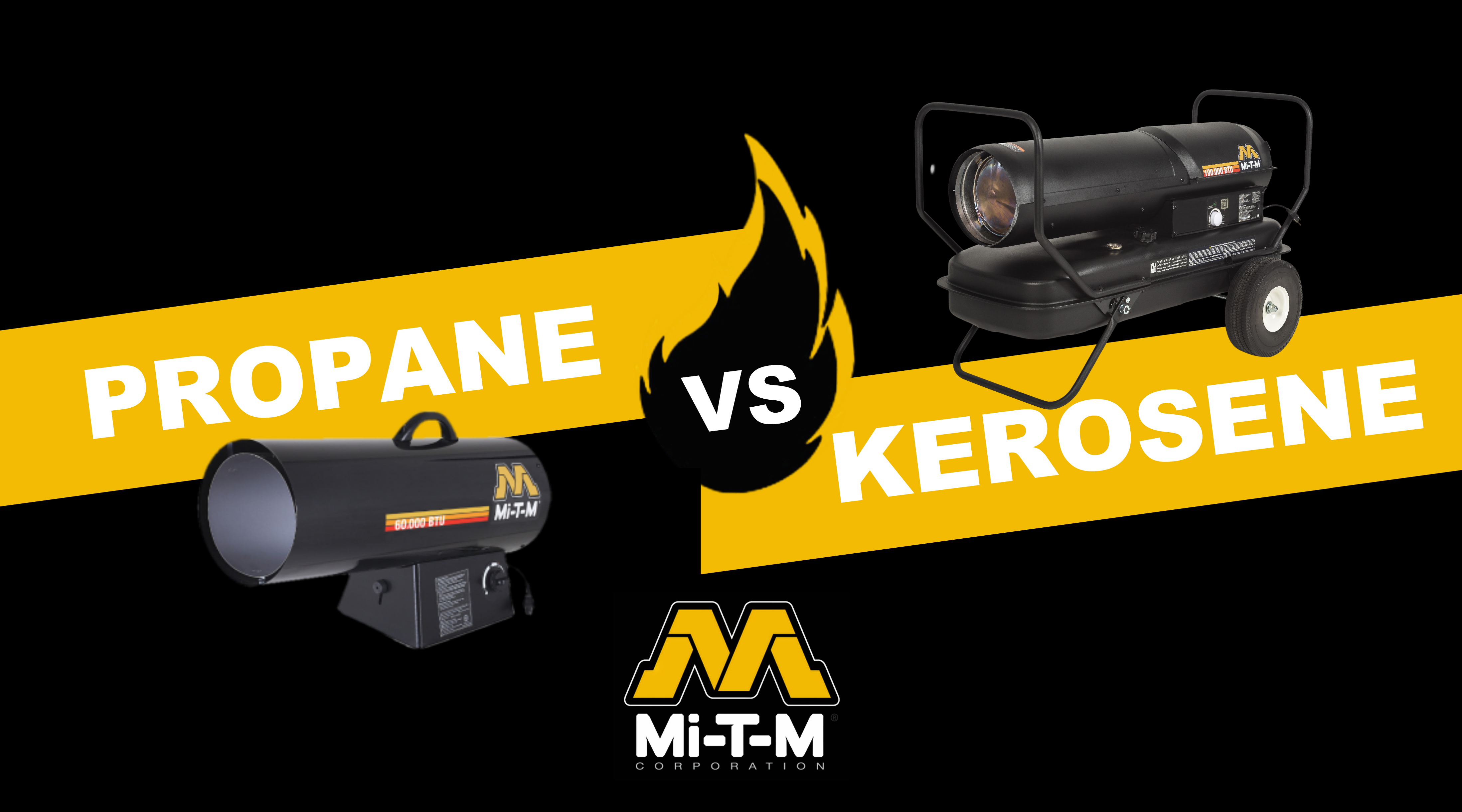
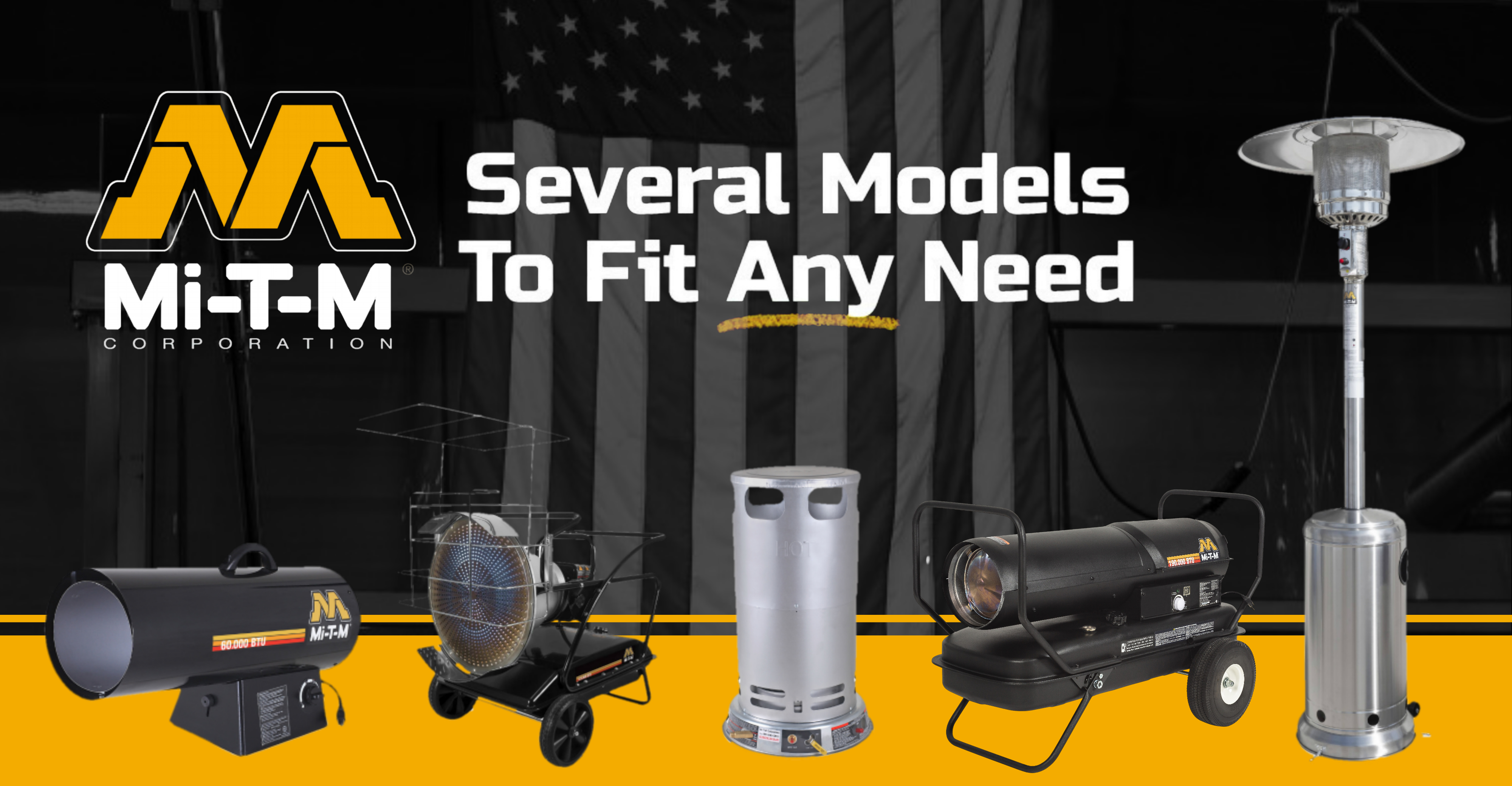
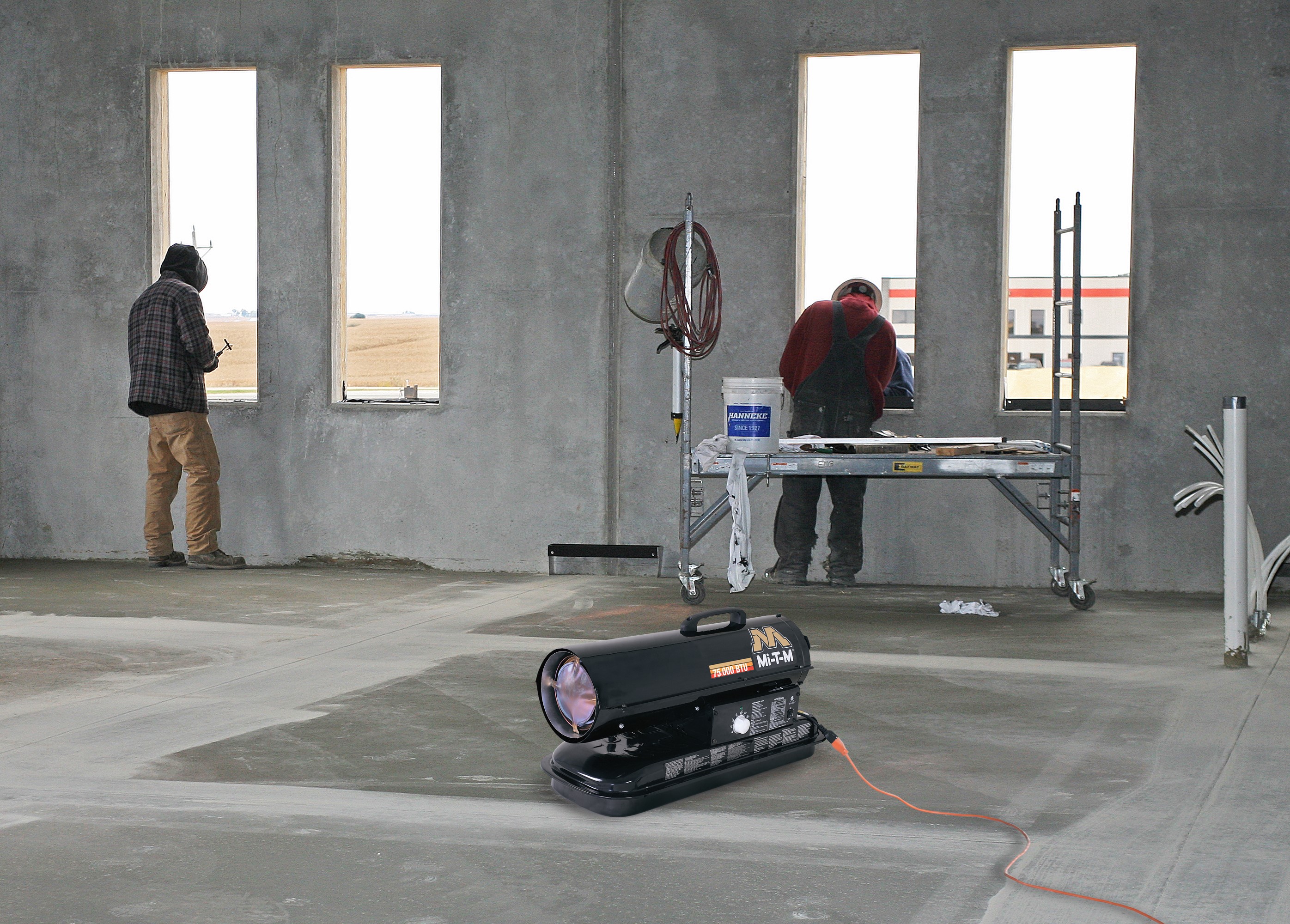
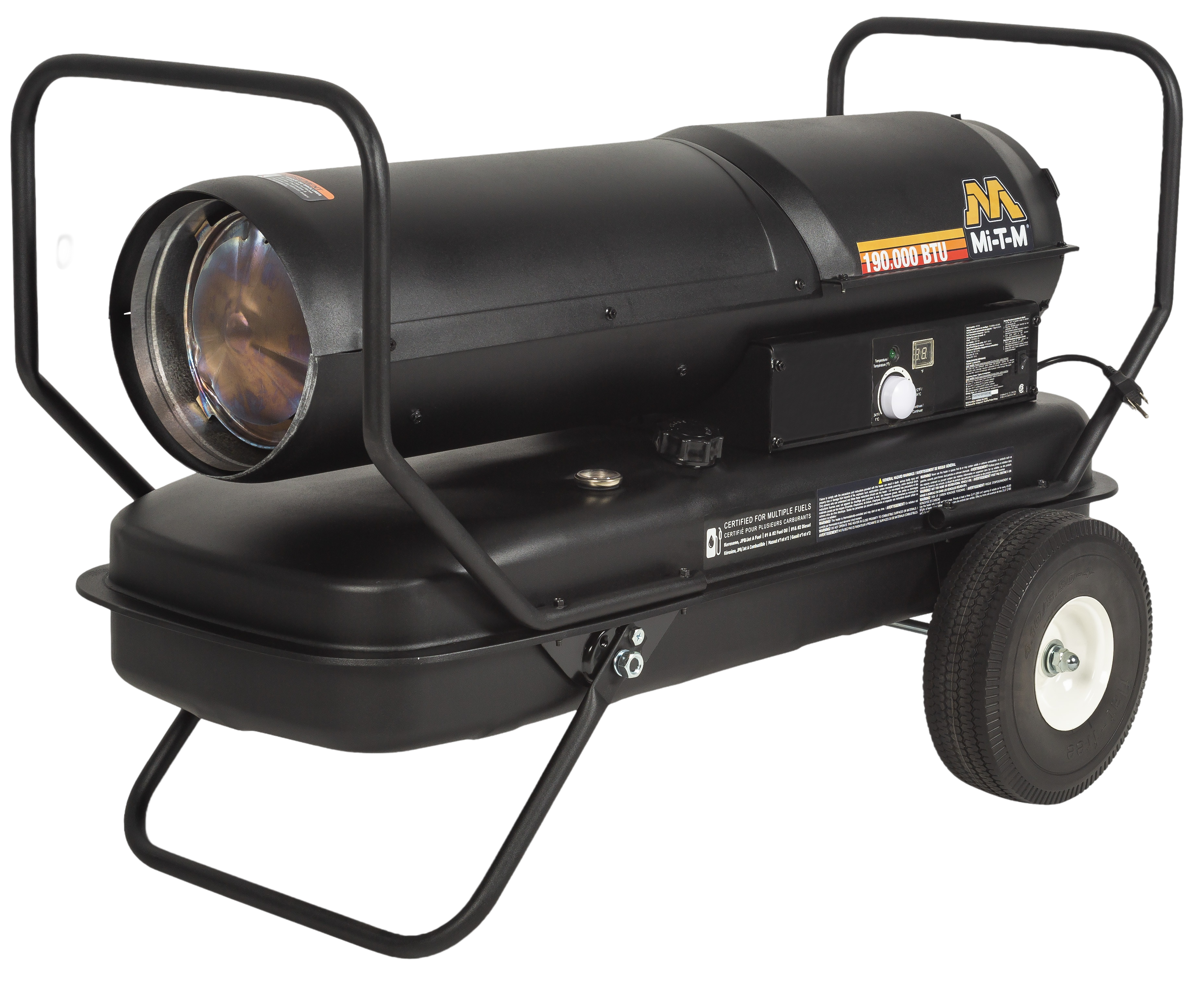
Which heater lets off less moisture? I do drywall and need some heat to help dry in colder months
Hi Donny, thanks for he great question. The kerosene heater lets off less moisture than the propane. Hope that was helpful.
So what is the moisture out between the two heaters, I know propane heater is about 0.98 gal pr hour at 100,000 btu, what is the kerosene water output?
A kerosene heater puts out about 1.1 gallons of moisture per gallon of Kerosene used compared to the propane that puts out .98. The moisture is not something you’ll see, as in a puddle, but more fogging up windows or leaving moisture of surfaces.
This is not true. Combustion ALWAYS produces water. When the oxygen in the air combines with hydrocarbons they release CO2 and H2O(water). How much water would need to be calculated but water is produced.
Hi Gregg,
Yep. We were wrong. A kerosene heater puts out about 1.1 gallons of moisture per gallon of Kerosene used compared to the propane that puts out .98. The moisture is not something you’ll see, as in a puddle, but more fogging up windows or leaving moisture of surfaces. Thanks for setting us straight.
So, if a kerosene heater puts out about 1.1 gallons of moisture per gallon of Kerosene used. Would this be specifically for portable convection heaters and not radiant heaters? I do NOT want moisture in my garage (well a tiny tiny bit) that will eat away at metal or rust beginning.
Which is kerosene heater is better in a garage? Convection or Radiant?
Hi Rusty, Radiant will give off less moisture if you’re running it in a vented garage. Let us know if you have any further questions & feel free to give us a call at 1-800-553-9053.
I have a 30-60 btu propane heater. I got it to heat an area in the garage i’m working. The problem is after about an hour it slows down putting out heat. I shake the 20lb propane tank and the heater goes back to putting out max heat for about 10 min. The temp today is 5 above. I’m thinking the cold is effecting how the propane burns. This heater does not me my needs. I’m leaning towards 150btu kerosene unit. Other than the fuel cost, what would be the downsides of using this type of heater in my garage. How many hours of usage running at 150 but would I get per gal?
Hi Bob, Thanks for reaching out to us…I will check with one of you service techs & get you an answer here shortly.
Bob,
Thank you for your interest in our Mi-T-M Equipment. Do you plan to move towards a Kerosene fired 135k or 190k? Or do you plan to move towards a 150k LP unit? I want to make sure we are giving you correct information on the exact unit you are looking for.
The propane in your tank is beginning to boil. Propane boils at a lower temp then water. It has to do with the amount being consumed at a time creating a pressure drop to the tank. The pressure drop created begins a boil in the tank. When you shake it and it works, think of when you stir a boiling pot of water. The boiling goes away then returns. This affects the burn because it’s the vapors that are burning at the burner, and they are burning vapors that went thru the turbulence created by the boil of the liquid in your tank. The solution is you need a bigger tank to accommodate the pressure drop due to the consuming demand.
I am concerned about safety in terms of ventilation. Which one will give the best safety in the area of air quality while working in my 18×24 garage? I am likely to buy one today.
George Watson
North Battleford,
Saskatchewan Canada
Hi George,
When using Kerosene or Propane heaters you must have adequate ventilation. If you are using one of these in your 18 x 24 ft. garage you should have all doors open. For propane, we’d recommend the 18,000 BTU cabinet heater, which has a heating area of 600 sq. ft. or the 40-60,000 BTU propane forced air heater with a heating area of 1,500 sq. ft. For kerosene, we recommend the 75,000 BTU kerosene forced air heater that has a 1,700 sq. ft. heating area.
We just moved into a 30 x 60 pole barn for our workshop. We are a non-profit that hires veterans to build burial flag cases for our veterans cemeteries and are the only burial flag case offered at Arlington National Cemetery.
We have 2-6 veterans a day right now working in our shop. I am very concerned about fumes of a kerosene vs propane and not that educated on either. Putting a heater on and then opening the doors to let the cold back in seems odd to me. Please recommend what you think would work for us. Also, if you offer non-profits such as ours any discounts or promotions please advise.
Many Thanks !
Joe Montgomery
Founder Operation Honor
Hi Joe,
We do not recommend using our kerosene or propane heaters in any enclosed environment. It sounds like an electric heater would be best for his needs. Mi-T-M does not offer electric portable heaters unfortunately. Hope this was helpful, Thanks!
Would a propane forced air torpedo heater be a viable option to heat a 15×30 enclosed tent on a deck? Would moisture be an issue? Thank you.
Hi Pete,
We do not recommend using our kerosene or propane heaters in any enclosed environment. It sounds like an electric heater would be best for his needs. Mi-T-M does not offer electric portable heaters unfortunately. Hope this was helpful, Thanks!
How much ” outside air” is needed per heater.. Propane – Kerosene to keep the carbon monoxide levels at safe levels in a 650 sqft garage and should you use a certified meter for safety..
Hi Ole,
It is important to run these heaters in well ventilated areas. Having a fresh air opening of at least 3 square feet for each 100,000 BTU per hour of heater output is recommended. A larger opening will be needed if more than one heater is being used. And yes, you should use a certified CO detector while running these heaters. Hope that answers any questions you may have, Thanks!
Hi I’m living in my camper for few more weeks my propane furnace went out which of the portable heathers do you recommend in my camper for heat propane or kerosene
Hi Beverly,
We do not recommend using our kerosene or propane heaters in any enclosed environment. It sounds like an electric heater would be best for his needs. Mi-T-M does not offer electric portable heaters unfortunately. Hope this was helpful, Thanks!
Would like to use a kerosene heater to warm up my bedroom. Will place the heater in the passage in front of my bedroom. Will that be safe. The front door will only be a few feet from the heater. Will I have to keep the front door open for air. Will be using the heater especially at night. May not be too safe. The passage in front of my bedroom leads to a large family room. Will that be enough for ventilation. Please let me know. Thanks.
Hi Karen,
Unfortunately the kerosene heaters are not safe to use in a home, you will need to find an electric alternative. Kerosene heaters are great for outdoor use or in a well ventilated area, but the fumes are unsafe in enclosed spaces. Hope that helps, let us know if you have any other questions.
Which heater would be better for storing in case of an emergency power outage?
Hi Vicki,
No Mi-T-M portable heater is suitable for indoor use. However, if you are looking for something to use in a well-ventilated workshop or garage please visit https://www.mitm.com/industrial/portable-heaters/. We offer many models to choose from.
Hi, I live in Omaha and my garage (one car) has a 238sqft area with a permanent opening in the ceiling of 2sqft. that connects to the attic in addition to two side windows, the back and garage door. ventilation should not be a problem, in fact, it appears that just the opening above is sufficient for a 60000 or 75000BTU unit.
I have access to K1 kerosene six blocks from home and propane within a mile. So my question is; kerosene or propane? Is it a matter of preference or in my case you have a suggestion about one or the other? What would you do if you live in my house?
Thank you.
Hi Sergio,
Either a kerosene or propane heater will work. You will have less fumes with a propane, however we recommend to keep your garage door completely open while using the heater. Let us know if you have any other questions & feel free to give us a call at 1-800-553-9053 for quick response. Thanks!
Hi I run a 3,000 sq ft yoga studio. It is currently heated by an air blower and 10 infrared heaters. I am looking to reduce the cost of my bills. I was looking at either deisel , keresone, or parafin heater to use before the class started to boost the overall warmth of the space. I have read the Parafin gives off moisture, is it a lot? also concerned with smell as. What would your recommendations be please ?
Hi Heather,
Diesel and kerosene heaters are not intended to be used indoors with limited ventilation because they give off carbon monoxide. MI-T-M does not have a paraffin heater in our product line unfortunately. Hope that helps, let us know if you have any other questions & feel free to give us a call at 1-800-553-9053 for quick response. Thanks!
er…
“Next you’ll want to consider how long each type of heater will keep you warm. A propane model running off a 20-pound propane cylinder set at low will last for 65 hours and set at high will last for 24 hours.”
You didn’t mention of how long a kerosene heater will run on with comparable fuel costs? lol.
Hi Eddie,
For direct comparison, it depends on the unit:
135K BTU = $5.15 per hour on propane
135K BTU = $10 per hour on kerosene
i have a 24×32 with 8′ ceiling R19 walls R15 insulation . Been considering getting a propane torpedo style heater to heat up fast before I go out to work in the pole barn and then turning off and I feel will keep it comfortable for several hours my question 100,000 BTU propane heater how mush propane will it use currently I only have a 20 lb propane cylinder and how long do you think it will take to bring the inside temperature from 40 degrees to 60 degrees ?
Hi Brian,
100,000 BTU heater requires a 100 lb cylinder to run. I would recommend the 30,000 BTU tank top heater for this application. It should only take about an hour to gain that temp. in that size of compartment.
https://www.mitm.com/portable-heaters/MH-0030-IM10/1898/
Let us know if you have any other questions, Thanks!
I’m a plasterer and do cultured stone, in the winter we tent and run heaters . We use kerosene forced air heaters but because of expense of kerosene we use diesel fuel.
What do you think about this? How safe and whatever thoughts about doing this I would like to know .
Hi James,
Diesel fuel can be used and will not affect the operation of the kerosene forced air heater. Make sure you have proper ventilation with any portable heater. Feel free to give us a call at 1-800-553-9053 if we can help with any other questions. Thanks!
Hi,
I know you say you cannot use forced air propane heaters inside an enclosed area. However, what if I have the heater outside and than duct the heat inside my building. Would this be considered safe?
Hi John,
Kerosene forced air heaters are not designed to be ducted into a building, but our directional heaters are. You can view them on our website at https://www.mitm.com/portable-heaters/series/elite-series/65/. Make sure you have proper ventilation with any portable heater. Feel free to give us a call at 1-800-553-9053 if we can help with any other questions. Thanks!
Hi, we are looking to warm our garage on cold days where we’ve made it into a hangout room for our teenager and overflow space of our home. Our garage has an additional external side door that goes from outside to in the garage. With an 18,000 btu propane heater is it safe to leave just the extra door open and keep the garage door closed and but a carbon monoxide detector just to be safe? Our gas water heater is located in the garage also. I was just reading one one of your responses that a 3×3 opening is sufficient for a 100,000 btu heater. Did I understand that correctly and will just opening that one door with something propping it open be ok to do? Thanks!
Hi Holly,
Leaving the walk door to the outside open should provide enough air exchange to operate the heater. However when a room is going to be occupied, make sure there is also a working CO detector in the room. Feel free to give us a call at 1-800-553-9053 if we can help with any other questions. Thanks!
Hi, looking to have a small gathering outside on my patio. I have a pop up and it will be against the house so 2 sides are open. I may close 1 side in so maybe 1 side open. Do you think a kerosene heater or propane?
Hi Bob, either a kerosene or propane heater will work, but a propane unit will have less odor. Make sure to have proper ventilation. Hope that was helpful, if you have any other questions, please feel free to give us a call at 1-800-553-9053.
HI, We are creating outdoor classrooms for our school, the largest tents are 800 square feet. We are interested in heaters to take the edge off, and faculty envisions at least 2 sides being open at all times. What type of heater would you recommend in this scenario? It’s a very small school so budget is an issue.
Hi Nancy,
We’d love to be of help, can you let us know where you are located so we can have someone in your area assist directly?
I’m considering using 40k propane torpedo heater to heat the crawl space under a cottage. Plenty of ventilation under cottage. Is CO likely to seep up into the cottage?
Hi Tim,
Yes, there is the possibility of CO to enter the cottage. Also a torpedo heater should be attended at all times it is running. I am assuming there is a lot of combustible material in the crawl space that could catch fire if the heater is left running. Please feel free to give us a call at 1-800-553-9053 if you have any further questions. Stay Happy & Safe!
Which heater is best for an average size house when electric & gas goes completely out
Hi Rose, Our heaters are not recommended for residential living areas. They’re designed to heat well-ventilated workshops, garages and jobsites. Please feel free to give us a call at 1-800-553-9053 if you have any further questions. Thanks!
These fuel figures are inaccurate.. Propane is the cleaner choice but its the most expensive…. diesel is probably the least expensive…. a 60000 btu Propane heater set on full power will consume a 20lb bottle in 7 hrs.
That’s 20 bucks at the bottle exchange…. an 80000 btu kerosene/diesel heater will consume 5 gallons in 9 hrs ,,, that’s 16 bucks for the diesel…
Hi John, Fuel prices are based off a US average. Depending on the size of the heater and fuel prices in your area it may vary on what type of heater is cheaper to operate for your specific needs. Let us know if you have any further questions & feel free to give us a call at 1-800-553-9053.
should these gas Monitor heaters be placed in a apartment of three rooms for heat ?
Hi Ellie, Our heaters are not recommended for residential living areas. They’re designed to heat well-ventilated workshops, garages and jobsites. Please feel free to give us a call at 1-800-553-9053 if you have any further questions. Thanks!
Where I can buy this?
Thanks for your message. Where are you located? We can have an Area Rep get in contact with you.
i have a single attached car garage, 12′ wide x 16′ deep, i am wondering what the best option is for heat using 120v and minimizing safety risk. Live in Ontario where it can get as low as -30 degrees c, looking to use it as a workshop for 1-2 hours each time maximum 3-4 times per week. Not worried about cost more what can heat up the space best, but also limit risk/safety.
Hi Daniel, We’d recommend either our 40-60,000 BTU propane forced air heater or 75,000 kerosene forced air heater. Make sure to always have proper ventilation when running these heaters. Please let us know if you need contact information for a dealer near you, our Sales Support phone number is (800) 553-9053.
Thanks so much for talking about the benefits of using propane to heat places. My cousin’s husband owns a restaurant and he’s been switching to propane gas for most of his heating and cooking needs. He’s been looking into finding a company he can hire to deliver propane so he always has it when he needs it.